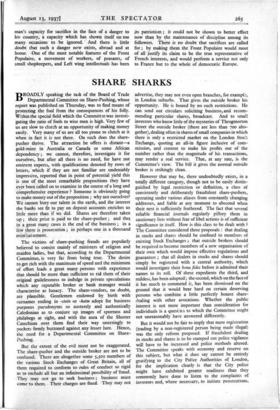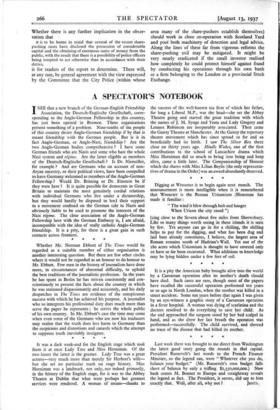SHARE SHARKS
BROADLY speaking the task of the Board of Trade Departmental Committee on Share-Pushing, whose report was published on Thursday, was to find means of protecting the fool from the consequences of his folly. Within the special field which the Committre was investi- gating the ratio of fools to wise men is high. Very few of us are slow to clutch at an opportunity of making money easily. Very many of us are all too prone to clutch at it when in fact it is not there. On such does the share- pusher thrive. The attraction he offers is distant—a gold-mine in Australia or Canada or some African dependency ; we cannot, therefore, investigate it for ourselves, but after all there is no need, for have not eminent experts, with qualifications denoted by rows of letters, which if they are not familiar are undeniably impressive, reported that in point of potential yield this is one of the most remarkable propositions they have ever been called on to examine in the course of a long and comprehensive experience ? Someone is obviously going to make money out of the proposition ; why not ourselves? We cannot bury our talent in the earth, and the interest the banks see fit to pay on deposit accounts enriches us little more than if we did. Shares are therefore taken up ; their price is paid to the share-pusher ; and that in a great many cases is the end of the business ; in a few there is prosecution ; in perhaps one in a thousand reimbursement.
The victims of share-pushing frauds are popularly believed to consist mainly of ministers of religion and maiden ladies, but that, according to the Departmental Committee, is very far from being true. The desire to get rich with the maximum of speed and the minimum of effort leads a great many persons with experience that should be more than sufficient to rid them of their original guilelessness to indulge in private speculations which any reputable broker or bank manager would characterise as lunacy. The share-vendors, no doubt, are plausible. Gentlemen endowed by birth with surnames ending in -stein or -helm adopt for business purposes pseudonyms so austerely and authentically Caledonian as to conjure up images of sporrans and philabegs at sight, and with the aura of the Shorter Catechism over them find their way unerringly to pockets firmly buttoned against any lesser lure. Hence, the need for a Departmental Committee on Share- Pushing.
But the extent of the evil must not be exaggerated. The share-pusher and the outside broker are not to be confused. There are altogether some 5,500 members of the various Stock Exchanges of Great Britain, all of them required to conform to rules of conduct so rigid as to exclude all but an infinitesimal possibility of fraud. They may not go to seek business ; business must come to them. Their charges are fixed. They may not advertise, they may not even open branches, for exampk, m London suburbs. That gives the outside broker his opportunity. He is bound by no such restrictions. He can send out circulars soliciting business, and recom- mending particular shares, broadcast. And to small investors who know little of the mysteries of Throgmorton Street the outside broker (there are less than 70o alto- gether), dealing often in shares of small companies in which there is only a restricted market on the London Stock Exchange, quoting an all-in figure inclusive of com- mission, and content to make his profits out of the number rather than the magnitude of his transactions, may render a real service. That, at any rate, is the Committee's view. The bill it gives the normal outside broker is strikingly clean.
However that may be, there undoubtedly exists, in a totally different category, though not to be easily distin- guished by legal restriction or definition, a class of consistently and deliberately fraudulent share-pushers, operating under various aliases from constantly changing addresses, and liable at any moment to abscond when their nest is sufficiently feathered. The fact that several reliable financial journals regularly pillory them in cautionary lists without fear of libel actions is of sufficient significance in itself. How is this class to be dealt with ? The Committee considered three proposals : that dealing in stocks and shares should be confined to members of existing Stock Exchanges k that outside brokers should be required to become members of a new organisation of their own which would impose effective regulations and guarantees ; that all dealers in stocks and shares should simply be registered with a central authority, which would investigate their bona fides before it admitted their names to its roll. Of these expedients the third, and mildest, has been adopted; the second, which on the face of it has much to commend it, has been dismissed on the ground that it would bear hard on certain deserving persons who combine a little perfectly honest share- dealing with other avocations. Whether the public interest is not more important than consideration for individuals is a quesio a to which the Committee might not unreasonably have answered differently.
But it would not be fair to imply that mere registration (trading by a non-registered person being made illegal) was the only reform proposed. If fraudulent dealing in stocks and shares is to be stamped out police vigilance will have to be increased and police methods altered. The Committee speaks with economy and reserve on this subject, but what it does say cannot be entirely gratifying to the City Police Authorities of London, for the implication clearly is that the City police might have exhibited greater readiness than they commonly have done to listen to the complaints of investors and, where necessary, to initiate prosecutions. Whether there is any further implication in the obser- vation that it is to be borne in mind that several of the recent share- pushing cases have disclosed the possession of considerable capital and the obtaining of enormous sums of money from the public, with the result that there is a possibility of police officers being tempted to act otherwise than in accordance with their duties, is for readers of the report to determine. There will, at any rate, be general agreement with the view expressed by the Committee that the City Police (within whose area many of the share-pushers establish themselves) should work in close co-operation with Scotland Yard and pool both machinery of detection and legal advice. Along the lines of these far from vigorous reforms the share-pushing evil may be mitigated. It might be very nearly eradicated if the small investor realised how completely he could protect himself against fraud by conducting his operations through his own bank or a firm belonging to the London or a provincial Stock Exchange.







































 Previous page
Previous page